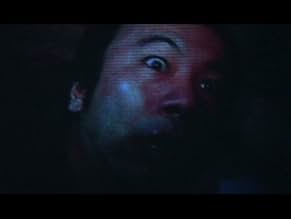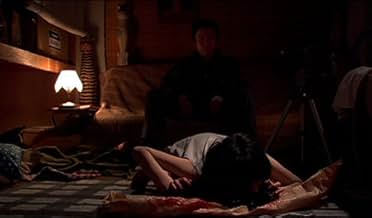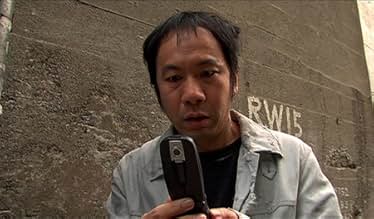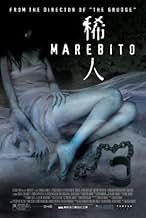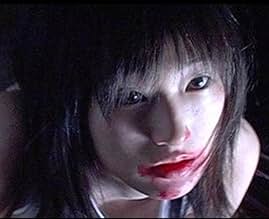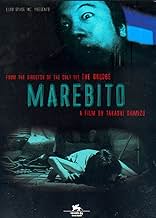IMDb-BEWERTUNG
6,0/10
5927
IHRE BEWERTUNG
Füge eine Handlung in deiner Sprache hinzuA fear-obsessed freelance cameraman (Shinya Tsukamoto) investigates an urban legend involving mysterious spirits that haunt the subways of Tokyo.A fear-obsessed freelance cameraman (Shinya Tsukamoto) investigates an urban legend involving mysterious spirits that haunt the subways of Tokyo.A fear-obsessed freelance cameraman (Shinya Tsukamoto) investigates an urban legend involving mysterious spirits that haunt the subways of Tokyo.
- Auszeichnungen
- 2 Gewinne & 1 Nominierung insgesamt
Empfohlene Bewertungen
7sol-
Also known as 'The Stranger from Afar', this Japanese horror film focuses on a freelance photographer who rescues a naked woman chained to a rock in a subway tunnel; he takes her home, only to discover that she is more animalistic than human with a taste for blood. The film is pretty much as weird as it sounds with little indication of just how much of what occurs is hallucination, imaginary or real. It remains a gripping ride though even when everything cannot be deciphered thanks to a truckload of atmosphere and a genuinely unsettling turn by Tomomi Miyashita as the mysterious woman. Some of the symbolism hits home quite well too with the protagonist viewing himself as a vampire, feeding off filming the misery and pain of others (sort of like Jake Gyllenhaal's character in 'Nightcrawler', but with a moral compass here). The film also taps into some curious territory early on as the protagonist announces a desire to find what caused a man to be so terrified that he committed suicide before his camera lens; some of his soliloquies in this early part of the film bring to mind 'Videodrome' as he equates cameras to the retinas of human eyes. One's mileage with 'Marebito' will no doubt vary depending on one's tolerance for the unexplained and deliberate ambiguity, but it is certainly refreshingly different from most other vampire movies out there.
This sounded very interesting to me in an abstract/visual experiment kind of way when I read about it. Man takes a movie camera to the subway of Tokyo in search of unspeakable horrors and comes up with some to take back to his apartment. I love movies that take a peripatetic approach, that take us on walkabouts through weird/elaborate architecture, from The Shining to Last Year at Marienbad, and I hoped this would be one of the greats.
I like these films to be shot in DV, lights are harsh and cold and space attains an immediacy that appeals to me. If I was disappointed in this then it's not because it meanders and is short on plot but rather because the lovely visual experiment is used by Shimizu to tell a story of almost EC Comics simplicity, madness and damnation. The protagonist sees news footage of a man stabbing his eye in the Tokyo subway. The epiphany to go looking in the subway for that ultimate terror gleaming in the victim's eyes moments before his death comes seemingly after a quick mashup of superimposed images of video screens, white noise, and reaction shots of the character looking dazed - a visual slapdash chaos that seems like the director's way of saying "something clicked in his mind" and nothing more.
I like that Shimizu simply took a camera to the streets of Tokyo to make Marebito, we really don't see enough films of that kind by people who know how to make them, and I wish he would've used Hollow Earth as a springboard of ideas instead of making direct allusions to it. I was fascinated by the subject in my teens, as with other mystical theories I'm still shocked that there are people who take it at face value, as something more than interesting myth (Shimizu fortunately is not one of them), yet the discussion in the subway tunnel where a bunch of arcane references to the subject are bandied up serves nothing. I'm still glad that I saw it though, made me want to see some more Shinya Tsukamoto.
In the end, Marebito is about a man's struggle with his own madness, but it's a bit slapdash about telling us about it.
I like these films to be shot in DV, lights are harsh and cold and space attains an immediacy that appeals to me. If I was disappointed in this then it's not because it meanders and is short on plot but rather because the lovely visual experiment is used by Shimizu to tell a story of almost EC Comics simplicity, madness and damnation. The protagonist sees news footage of a man stabbing his eye in the Tokyo subway. The epiphany to go looking in the subway for that ultimate terror gleaming in the victim's eyes moments before his death comes seemingly after a quick mashup of superimposed images of video screens, white noise, and reaction shots of the character looking dazed - a visual slapdash chaos that seems like the director's way of saying "something clicked in his mind" and nothing more.
I like that Shimizu simply took a camera to the streets of Tokyo to make Marebito, we really don't see enough films of that kind by people who know how to make them, and I wish he would've used Hollow Earth as a springboard of ideas instead of making direct allusions to it. I was fascinated by the subject in my teens, as with other mystical theories I'm still shocked that there are people who take it at face value, as something more than interesting myth (Shimizu fortunately is not one of them), yet the discussion in the subway tunnel where a bunch of arcane references to the subject are bandied up serves nothing. I'm still glad that I saw it though, made me want to see some more Shinya Tsukamoto.
In the end, Marebito is about a man's struggle with his own madness, but it's a bit slapdash about telling us about it.
I highly suggest seeing this film if you are a fan of Shimizu's works. Apparently it was filmed before Ju-On, in only eight days. This shows what a master filmmaker can do in such a short time. This movie will make you feel very uncomfortable and extremely disturbed. It is about a camera man who wants nothing more than to feel the most extreme fear. He than finds a subterranean lair filled with eerie creatures called Deros, and he finds a girl (or a creature much like a girl) chained to a rock and takes her home to care for her. He attempts to feed her but he finds that the only thing that she'll eat is blood. The only problems I had with it were the shaky camera moves (Blair-Witch style)but since he only made it in eight days...he has an excuse, and it will go to a normal camera to give your eyes a break. Overall a masterpiece in psycho-horror.
A strange film by Grudge writer/director Takashi Shimizu.
Shinya Tsukamoto (Ichi the Killer) is consumed with finding out the source of terror that caused a man to stab himself in the eye. He wants to experience the same terror - terror so horrible that it would cause you to want to kill yourself.
He goes underground looking for the beings that inhabit the tunnels under Tokyo and finds a naked girl, who he brings home to live with him. The girls is more animal than human and he kills to provide her blood rather than give her his own blood, which she wants.
It is not certain throughout whether he is going mad or finding what he is searching for. He even tries to escape, but resumes the search until he finally succumbs to the terror.
Despite the shaky camera work, which some like, but which distracts me, it was a fascinating look at terror and certainly a film that contains much more than available at first glance. A blend of mysticism and horror, it is a worthy view for fans of Japanese horror.
Shinya Tsukamoto (Ichi the Killer) is consumed with finding out the source of terror that caused a man to stab himself in the eye. He wants to experience the same terror - terror so horrible that it would cause you to want to kill yourself.
He goes underground looking for the beings that inhabit the tunnels under Tokyo and finds a naked girl, who he brings home to live with him. The girls is more animal than human and he kills to provide her blood rather than give her his own blood, which she wants.
It is not certain throughout whether he is going mad or finding what he is searching for. He even tries to escape, but resumes the search until he finally succumbs to the terror.
Despite the shaky camera work, which some like, but which distracts me, it was a fascinating look at terror and certainly a film that contains much more than available at first glance. A blend of mysticism and horror, it is a worthy view for fans of Japanese horror.
Thanks to his series of ghost stories, "Ju-on", Japanese director Takashi Shimizu has become one of the most recognized names of the New Wave of Asian horror cinema, the movement of young Asian directors that since the late 90s has produced some of the best and most original horror movies of the last years. The enormous success of his "Ju-on" series took Shimizu to the U.S., in order to direct a remake of the third installment of the series ("Ju-on: The Grudge"), named simply as "The Grudge"; but right before working on the remake, Shimizu took some days with fellow director Shinya Tsukamoto and a small crew to make a very low-budget horror movie, pretty much on the style he used to make when "Ju-on" was a straight to video release, but this time with a very different kind of story.
Masuoka (Shinya Tsukamoto) is a freelance cameraman almost completely detached from the world and entirely focused on his preference for videotaping and doing camera-work. Onde day, he accidentally tapes the suicide of a man named Arei Furoki (Kazuhiro Nakahara) on a subway station. The strange characteristics of this event, makes Masuoka to be obsessed with the idea of a fear so powerful that only death can erase, so in an attempt to understand Furoki's fear he descends into the underground tunnels of Tokio, discovering the entrance to a bizarre cavern that seems like a passage to the underworld. Is in this caverns where he finds a naked girl (Tomoi Miyashita) chained to the wall. He unchains her and takes her to his apartment, but soon he discovers that this girl (whom he names "F") is not a normal person, and that her presence in his world will make a darker side of him to come out.
"Marebito" was written by Chiaki Konaka (better known as the writer of the famous anime, "Serial Experiments Lain"), and like most of his works, it is a dark psychological story with a slight cometary on the relationship between humans and the technology they produce. Narrated by Masuoka, the story is told from his perspective, so we are taken along him through his discovery of mysteries that should be better kept secret and the terrific consequences of his actions. It is very Lovecraftian in the sense that, like in the stories by H.P. Lovecraft, we have a main character who may not be entirely sane, and whom his curiosity takes him to the darker sides of human nature. His relationship with the strange girl "F", and his attempts to establish communication with her become the focal point of the plot of "Marebito", although like in other works by Konaka, reality is not always what it seems.
It seems that this "return to roots" was really beneficial for Takashi Shimizu, as the work he offers in "Marebito" is once again a very fresh and original horror movie that proves that there is more in this young director than the "Ju-on" series. By working again on a shoestring budget, Shimizu is able to capture the simple and monotone life of Masuoka, and with the use of digital video he mimics the world as his main character sees it: a world through the camera lens. While the movie moves at a very slow pace, it really is an improvement over the style of using disjointed story lines in "Ju-on", and never falls into the trap of being boring or repetitive (a common flaw of the "Ju-on" movies). However, a trait kept from "Ju-on", is Shimizu's skill to create ominous haunting atmospheres with common everyday objects, this time, the video screens and what's on them is the focus of the film.
Shinya Tsukamoto is better known as the director of the remarkable and influential films like "Tetsuo" (1989) and "Tokyo Fist" (1995), but here he offers his talents as an actor in a film where he plays the main character. While a very talented director, Tsukamoto is not really a great actor, and both he and Shimizu seem to be aware of that, so his portrait of Masuoka is conceived as a typical man with obsessive behavior, entering the unknown. The movie's highlight is Tomomi Miyashita, who gives life to the feral child "F", with a frighteningly believable performance that definitely gives the chills. Kazuhiro Nakahara, Miho Ninagawa and Shun Sugata appear in supporting roles, but their appearances are limited, as the movie focuses entirely on Masuoka and the consequences of his relationship with "F".
"Marebito" is an excellent example of how imagination and a good plot can make a film work even with the most limited resources. Of course, the movie suffers the most in the special effects department, with some of the visuals looking painfully amateurish (although probably that was the intention). The use of digital camera may be annoying to those expecting a good looking film, but instead of being a flaw, its use in the film gives the story a realistic tone, as if we were really watching a person's descent into madness. Some people have criticized the convoluted plot of Konaka's story, filled with many details and references that often make no sense or have twisted meanings in the movie; however, I find the storyline captivating because of that unpredictability, and the fact that Shimizu moves away from the ghost stories that have become typical of Asian horror is really refreshing.
With his "Ju-on" ghost stories, Takashi Shimizu became known worldwide as a major horror director, but personally I think that "Marebito" is the movie that truly reveals him as a horror author. It's not a movie destined to be a hit, but it's one that shows a different take on horror and while maybe "The Grudge" is the movie that most people relate to Shimizu, but personally, I think that "Marebito" is a much better and more satisfying movie. 8/10
Masuoka (Shinya Tsukamoto) is a freelance cameraman almost completely detached from the world and entirely focused on his preference for videotaping and doing camera-work. Onde day, he accidentally tapes the suicide of a man named Arei Furoki (Kazuhiro Nakahara) on a subway station. The strange characteristics of this event, makes Masuoka to be obsessed with the idea of a fear so powerful that only death can erase, so in an attempt to understand Furoki's fear he descends into the underground tunnels of Tokio, discovering the entrance to a bizarre cavern that seems like a passage to the underworld. Is in this caverns where he finds a naked girl (Tomoi Miyashita) chained to the wall. He unchains her and takes her to his apartment, but soon he discovers that this girl (whom he names "F") is not a normal person, and that her presence in his world will make a darker side of him to come out.
"Marebito" was written by Chiaki Konaka (better known as the writer of the famous anime, "Serial Experiments Lain"), and like most of his works, it is a dark psychological story with a slight cometary on the relationship between humans and the technology they produce. Narrated by Masuoka, the story is told from his perspective, so we are taken along him through his discovery of mysteries that should be better kept secret and the terrific consequences of his actions. It is very Lovecraftian in the sense that, like in the stories by H.P. Lovecraft, we have a main character who may not be entirely sane, and whom his curiosity takes him to the darker sides of human nature. His relationship with the strange girl "F", and his attempts to establish communication with her become the focal point of the plot of "Marebito", although like in other works by Konaka, reality is not always what it seems.
It seems that this "return to roots" was really beneficial for Takashi Shimizu, as the work he offers in "Marebito" is once again a very fresh and original horror movie that proves that there is more in this young director than the "Ju-on" series. By working again on a shoestring budget, Shimizu is able to capture the simple and monotone life of Masuoka, and with the use of digital video he mimics the world as his main character sees it: a world through the camera lens. While the movie moves at a very slow pace, it really is an improvement over the style of using disjointed story lines in "Ju-on", and never falls into the trap of being boring or repetitive (a common flaw of the "Ju-on" movies). However, a trait kept from "Ju-on", is Shimizu's skill to create ominous haunting atmospheres with common everyday objects, this time, the video screens and what's on them is the focus of the film.
Shinya Tsukamoto is better known as the director of the remarkable and influential films like "Tetsuo" (1989) and "Tokyo Fist" (1995), but here he offers his talents as an actor in a film where he plays the main character. While a very talented director, Tsukamoto is not really a great actor, and both he and Shimizu seem to be aware of that, so his portrait of Masuoka is conceived as a typical man with obsessive behavior, entering the unknown. The movie's highlight is Tomomi Miyashita, who gives life to the feral child "F", with a frighteningly believable performance that definitely gives the chills. Kazuhiro Nakahara, Miho Ninagawa and Shun Sugata appear in supporting roles, but their appearances are limited, as the movie focuses entirely on Masuoka and the consequences of his relationship with "F".
"Marebito" is an excellent example of how imagination and a good plot can make a film work even with the most limited resources. Of course, the movie suffers the most in the special effects department, with some of the visuals looking painfully amateurish (although probably that was the intention). The use of digital camera may be annoying to those expecting a good looking film, but instead of being a flaw, its use in the film gives the story a realistic tone, as if we were really watching a person's descent into madness. Some people have criticized the convoluted plot of Konaka's story, filled with many details and references that often make no sense or have twisted meanings in the movie; however, I find the storyline captivating because of that unpredictability, and the fact that Shimizu moves away from the ghost stories that have become typical of Asian horror is really refreshing.
With his "Ju-on" ghost stories, Takashi Shimizu became known worldwide as a major horror director, but personally I think that "Marebito" is the movie that truly reveals him as a horror author. It's not a movie destined to be a hit, but it's one that shows a different take on horror and while maybe "The Grudge" is the movie that most people relate to Shimizu, but personally, I think that "Marebito" is a much better and more satisfying movie. 8/10
Wusstest du schon
- WissenswertesTakashi Shimizu shot the film in just eight days, between the production dates for Ju-on: The Grudge (2002) and its remake, Der Fluch - The Grudge (2004).
Top-Auswahl
Melde dich zum Bewerten an und greife auf die Watchlist für personalisierte Empfehlungen zu.
- How long is Marebito?Powered by Alexa
Details
Box Office
- Budget
- 5.000.000 ¥ (geschätzt)
- Bruttoertrag in den USA und Kanada
- 13.983 $
- Eröffnungswochenende in den USA und in Kanada
- 3.852 $
- 11. Dez. 2005
- Weltweiter Bruttoertrag
- 107.259 $
- Laufzeit1 Stunde 32 Minuten
- Farbe
- Seitenverhältnis
- 1.85 : 1
Zu dieser Seite beitragen
Bearbeitung vorschlagen oder fehlenden Inhalt hinzufügen



